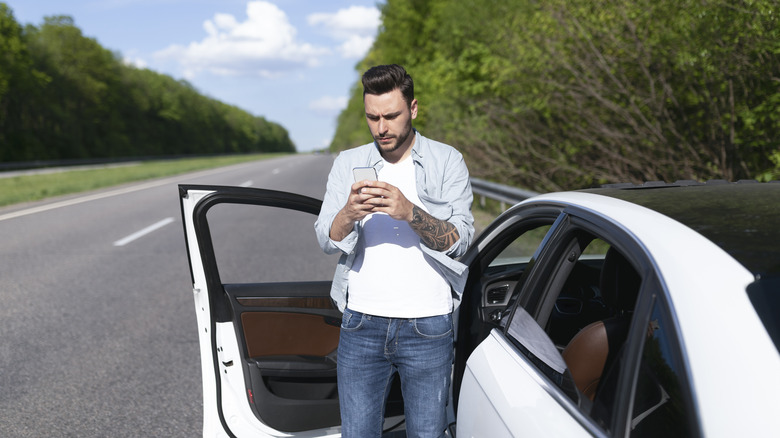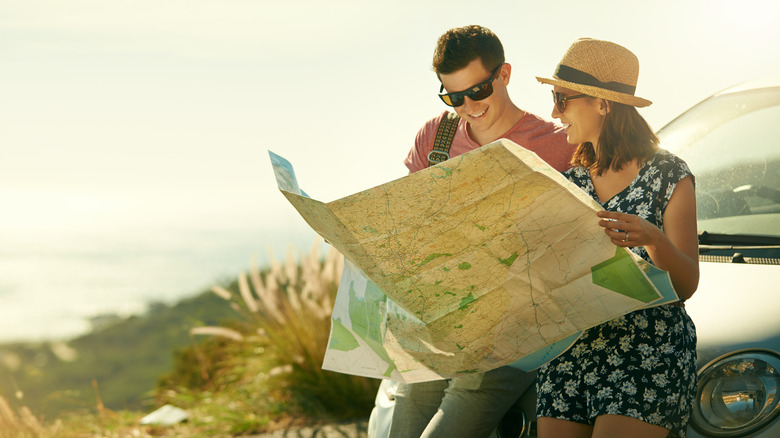Travel Guides Road Trips
Caitlyn Knuth
In the age of smartphones, the way we navigate the world has understandably become something that’s done at the simple touch of a button. Type in an address and all you really have to do is let the technology lead the way. Statista reports that by 2028, smartphone mobile network subscriptions globally will surpass 7.7 billion.
For some smartphone owners, it’s hard to imagine navigating the roads any other way than with a trusted and true maps app in hand. Others have lived through a time before smartphones when physical maps were the only option for getting from point A to point B successfully. Even before GPS devices entered the marketplace, maps were folded up and tucked away in the back pockets of passenger seats and glove compartments across the country.
If you have never had to use a physical map, it can inevitably seem outdated and tedious. However, there’s still a lot of value to keeping one in your car, especially when you’re venturing out for long road trips into the great unknown. For some, this might require taking time before a trip to get acquainted with how to read a physical road map but when it comes to elevating your travel safety standards, it’s an effort that’s worth your while.
You never have to worry about charging or service

Prostock-studio/Getty Images
It’s simple to fall into a false sense of comfort that comes with exclusively depending on smartphone technology to map out road trips. Ask anyone who has ever faithfully followed digital directions straight to the end of a closed mountain road with nowhere to go. Yes, features like Google Maps can simplify life, but trusting a maps app has limitations.
One limitation is the dreaded digital dead zone. Depending on where you’re traveling, there’s always a chance that you’ll find yourself on a remote road that doesn’t support cell service. This leaves you entirely on your own to navigate roads that could lead you into unwanted situations. In these scenarios, having a physical map in your vehicle provides you with a guaranteed backup. You can navigate your way back to main roads manually using a physical map. This can be done without having to panic about getting lost for hours on end and can be a lifesaver when detrimental weather conditions are involved.
Another important reason to consider having a physical map in your car is that it’s something that doesn’t have to be charged to remain useful. Maps don’t require or run out of battery power. There’s nothing worse than having to endlessly worry about your phone charge failing when it’s your only indicator of where you’re at and where you’re going. A physical map is there and ready to go when a phone charger isn’t anywhere to be found.
A safety first solution

Aj_watt/Getty Images
Road trips are known for being exciting experiences for travelers whether you’re in a car, van, or making the most of an RV trip. They also come with a reputation for unexpected encounters along the way. While this can be half the fun, it’s far less enjoyable to be taken by surprise during a road trip with something like losing your phone.
This can be especially frustrating if your phone is your only road map. It’s easy for phones to get left behind at sightseeing stops, stolen, or lost after falling out of your pocket while adventuring. In any case, having a physical map in your car could be the difference between an even more stressful scenario or one with backup navigation solutions right at your fingertips.
There are times when having a physical road map in the car as a backup might be the key to getting you out of unpleasant scenarios too. If your digital map app fails for any reason, a physical map gives you a way to reroute yourself out of needing to stop at gas stations or other unfamiliar locations late at night to ask for directions. Additionally, physical road maps often indicate routes to nearby hospitals and police stations for travelers who are in need of assistance.

